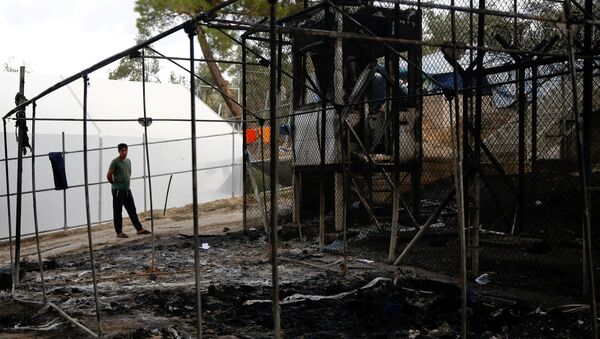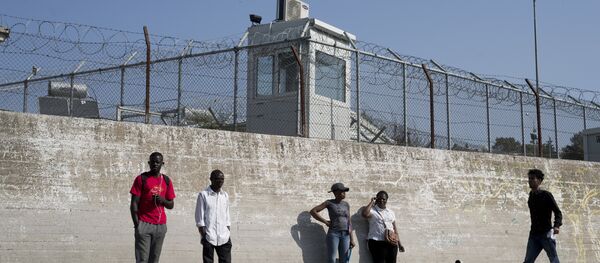Sputnik: The locals in Lesbos have been very critical of the Greek government policies towards migrants and refugees. Is this criticism justified, in your view?
Eleni Takou: It is criticized, although one has to stress out from beforehand that any kind of xenophobic incident as the ones we have seen recently cannot not be justified, because I'm sure you're aware of the fact that some weeks ago we had a huge incident of racist violence on the island and as a human rights organization we understand there is a problematic situation there; we have been working on the ground, but at the same time one has to be aware of justifying xenophobic incidents, so just to answer your question, yes, there is a justifiable protest from the people in Lesbos because the infamous EU-Turkey deal that has been engaged for two years now, presupposes that people are stranded on the island until their asylum claim is processed, which is a very lengthy process, which resulted in the fact that there's been thousands of people right now accumulating on the island in very dire conditions, and this also creates a very stressful climate on the island as well.
Sputnik: Just try to explain to us in a little more in detail, now the mayor of Lesbos said that the situation on the island is exceptionally difficult, we understand that but, obviously, you could probably give us some visual pictures grammatically, how does the migrant crisis affect the local population on these islands now?
Sputnik: Who in your view is responsible for the crisis? And how could it be resolved? Is it leveled squarely at the EU with regard to the agreement that they underwrote back in 2016?
Eleni Takou: The responsibility falls mostly on the EU; what the EU has done after the 2015 welcoming spirit that we have all witnessed in Europe is that all of a sudden Europe decided that we cannot take any more people, so they decided to close down the borders and put all the burden on […] member states one of which is Greece. So this is mostly up to Europe because one has to understand that people are actually fleeing from war and poverty, and if the European states do not provide any legal pathways to do that then people will travel illegally, and this will end up in the situation we see on the Greek Islands, and on the Turkey-Libyan coast as well. Of course there's also the responsibility of the Greek government that has not done anything to better the conditions of living for these people, and this has also been criticized, but at the same time we must not forget that this is an EU policy that's being implemented in the Greek borders, so yes, the primary responsibility does fall upon the EU.
Sputnik: Do you think that this particular agreement also gives Turkey leverage over Greece when it comes to disputes between the two countries?
Eleni Takou: Of course the EU tried to externalize migration management to third country states such as Turkey. What they did is they gave a lot of leverage to these countries, so all of a sudden Turkey became the regulator of the flow of immigration in the region, but, of course, Turkey is a country where there's not much political stability right now, but the main issue is that although all this exists, and I think it was a false decision to make Turkey the regulator of the situation, even Turkey has been burdened a lot by refugees; right now there are more than 2.5 million refugees living in Turkey, so it's understandable that also the Turkish people say you European guys have to take your fair share of the responsibility.
The opinions expressed are those of speaker alone and do not necessarily reflect the position of Sputnik News.



